Overall winner and top entrepreneur: export markets

At 27, Nomzamo Khoza is the youngest winner of the department of agriculture, forestry and fisheries’s female entrepreneur of the year award.
Khoza was honoured for her outstanding achievements in farming and the breadth of her product distribution networks.
Her 100% natural products are sold in South Africa as well as Mozambique and Argentina. She also aims to expand her business to the US.
Based in the Mnini area, near Port Shepstone in KwaZulu-Natal, Khoza owns a farming enterprise which makes People’s Bio Oil and Morana Fire for Africa.
Through the farming enterprise, Khoza produces 201 natural products such as tonics, hair food, body products and seasoning made from the moringa tree.
This tree grows in Africa and Asia and its leaves — which can be chewed or ground to a powder — are considered a super food because they are rich in vitamins A and C.
They are also excellent sources of calcium, potassium and protein.
Khoza also grows chillies and parsley, which are dried for seasoning. The enterprise employs 120 people in its nurseries, farm, offices and factory.
Her business is committed to the development of rural communities by providing business and farming skills.
Khoza received R1-million in prize money and says she had not expected to get this far with her venture. “Agriculture right now is the only way to go,” she says.
Top entrepreneur: national markets
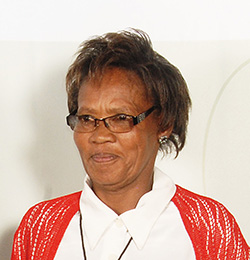
A childhood spent looking after orphaned lambs prepared Maria Malan for a rewarding career in sheep farming.
The 52-year-old sheep farmer, who started farming in 2001 with 40 ewes, is now a prize-winning, certified producer of Karoo lamb as well as the 2013 winner of the department’s female entrepreneur award in the national market category.
Malan’s Karoo lamb is approved by the South African Meat Industry Company, the quality assurance company of the red meat industry of South Africa, and is revered for its great taste.
Malan runs her sheep farm from land that she rents from the department in Rondefontein, Northern Cape.
She believes that pairing ewes with compatible rams is the key to the success of her venture, which has so far achieved a 200% lambing rate.
This means that all her ewes have produced twins, ensuring a steady supply of quality meat coming out of her farm.
She has to be careful of overgrazing, compelling her to sell all her lambs every season.
Malan has now taken to mentoring her daughter and son so that they can run their own farms in future and continue her father’s proud legacy.
Best subsistence producer
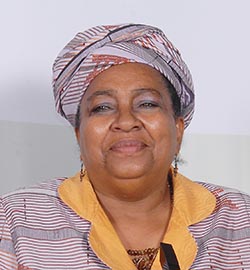
Kenalemang Kgoroeadira combined two passions — empowering women and farming — when she founded Thojane Organic Farm in 2009.
This partnership has been a resounding success and has earned Kgoroeadira the title of best female subsistence farmer in South Africa. The 61-year-old started the project on a hectare of land as a cooperative of six members.
Just three years later the farm produces tons of green beans, spinach and tomatoes, which is sold to local markets and school feeding schemes around Boekenhout village near Rustenburg, North West.
Some of the produce is donated to hospices. The produce is healthy and environmentally sound because it is grown without the aid of chemicals, which can strip the soil of its nutrients.
Instead, the farmers use fertilisers that are found naturally, such as chicken manure.
This forms part of the co-operative’s commitment to maintaining agricultural systems that are similar to those found in natural ecosystems.
The cooperative recently started a herb garden with rosemary, thyme, lemon grass, mint, lavender and garlic.
Kgoroeadira says they plan to extract essential oils from these herbs to protect their crops.
They also aim to supply retailers that sell organic produce, such as Woolworths.
“Our mission is to train women and young people to become food producers,” says Kgoroeadira.
Top entrepreneur: processing

Rosy Molete-Motlanyane (36) puts her name on her cheese and milk as a testament to the quality of her products.
Her unwavering commitment to quality and creating employment in her community of Bethlehem in the Free State has earned her the department’s top award in the processing category.
“We prefer to do things manually so that we employ people. We mix, label and fill our packages ourselves,” she says.
Molete-Matlanyane started Rosy’s Dairy in 2011. She prides herself on her handmade haloumi and Gouda cheeses.
All products made by Rosy’s Dairy, including yoghurt and sour milk, are processed from locally sourced milk.
Molete-Matlanyane buys the milk from neighbouring farms and processes it in her 65 m2 dairy and shop.
The milk is pasteurised and undergoes stringent tests to ensure that it is safe and healthy to drink before it is sold to the local military base, Sandwich Baron and Save Rite supermarket.
Molete-Matlanyane trains eight young people from her community every year, empowering them with skills and employment opportunities.
Rosy’s Dairy will soon move to a bigger building, says Molete-Matlanyane.
“We will then be able to expand to other products like soy milk, juice and vegetable packing.”
Top entrepreneur: commercial
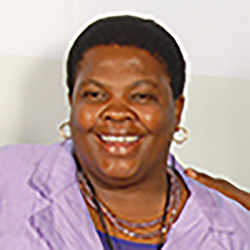
A bold move to self and community empowerment has paid off handsomely for Mpumalanga-based farmer Cynthia Mokwena.
The 45 year-old, among those honored for her achievements in this year’s FEA, does not only grow bananas, spinach and tomatoes to supply local hawkers, her specialty is forestry.
The business enterprise started in 2001 and by 2007 she was supplying Sappi with items such as potting and growth medium for plant propagation and landscaping.
Currently, the gum trees and other wood that she and her staff debark are used as pulp, mining timber for building and as electrical poles.
To keep the production side of the business going Mokwena has hired 27 permanent employees, seven of them women as well as 18 young people.
With the remarkable growth of the business, she also employs 15 seasonal workers.
Since 2011, Mokwena has been operating from the farms DaGama and Legogote, which the government bought from their previous owner in a state of neglect in 2005.
The 700ha of farmland has been strategically split into 350ha for grazing, 300ha for gum trees and 50ha for subtropical crops and vegetables.
Although she does not own the land, Mokwena holds a leasing contract.
Top entrepreneur: smallholder
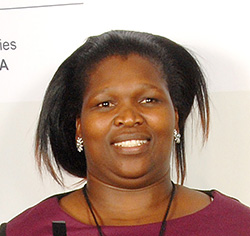
The plight of the people in the poverty stricken area of Ugie in the Eastern Cape is what moved Lungelwa Kama (35) to start her project.
Kama opened her doors for business in 2009 and now grows potatoes, cabbage, spinach and maize in her 267ha-farm, Arcstone 7cc, less than 2km outside Ugie.
“My wish is to be a commercial farmer and create more job opportunities because there are many jobless people,” Kama said.
Making great strides in helping families to put food on their tables, her smallholding currently has six permanent workers, but retains 48 others as casual labour.
The smallholding produces 60ha worth of potatoes, cabbage, spinach as well as 80ha worth of maize, all tended to by the workers.
Kama rents a potato washer to clean, sort and pack the potatoes and the produce is sold at the market in Mthatha and in surrounding villages.
Kama has great hopes for her smallholding, which has 48ha of unused arable land. She has encouraged others to learn from her example.
“I would like to encourage every-one to farm because the Eastern Cape is very rich when it comes to farming,” she said.
Best female worker
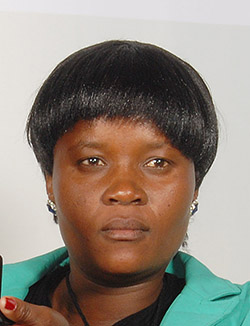
From a humble general worker, Sphiwe Machika has risen to broiler team leader in two years.
Machika, who works at the Gauteng-based Rethabiseng Farming Project, was promoted to the position of broiler team leader in December 2012 after she showed remarkable leadership skills.
Having shown great initiative in the short time that she worked there, the 28-year-old has been trusted with the training of newly recruited casual workers. She takes pride in teaching them the ropes and showing them how to work on the farm.
Machika says her achievements have encouraged her to pursue a career in agriculture and she now intends to obtain a diploma in agricultural studies.
She currently counts looking after the irrigation equipment among her duties, but her responsibilities also include record keeping on the use of pesticides, yields and costs.
The 6ha farm does not only comprise of chicken broilers, but also produces vegetables, including lettuce, carrots, cabbage and spinach.
It is in the broiler section that she shines — among her duties are weighing chickens, checking their medication and handling sales.
On a daily basis, Machika also ensures that the team she leads performs the required tasks.
Minister’s special award: disabled female entrepreneur
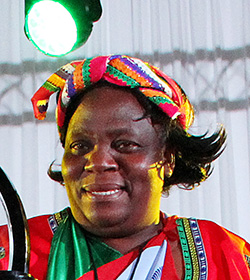
Physical disability and the need to fight abject poverty and unemployment in her community have only fueled ambition in Josephina Raserope, a woman who leads a broiler project in her home village of Shiawela near Phalaborwa.
Born in Limpopo, the courageous woman has beaten incredible odds and now boasts ownership of the Tanani Matiko Multipurpose Co-operative, an unusual employer conceived by a group of elderly women, three of them with various forms of physical disability, ranging from limps to blindness.
The project, only on its sixth year is run from a 2ha piece of land, but has had a huge impact not only to the lives of the 13 women who have worked on it since inception, but also on the community in which it runs.
Its beneficiaries over the years include women who are keen on farming or starting their own broiler projects.
In a bid to help in alleviating poverty in the community, Raserope’s project goes as far as donating some of its stock to the needy, such as orphans, and sometimes to bereaved families to use during funerals.
Empowering and capacitating other women have become Raserope’s passions.
Minister’s special award: young entrepreneur
Preline Swart owes her success in farming to embracing knowledge and technology.
The Swart Farming enterprise has been in operation for 33 years and is now occupied by a third generation of farmers.
It was recently registered as a closed corporation.
Swart (31) has prepared herself with extensive training since her introduction to farming five years ago.
She realises the importance of sound financial management in running an enterprise that is responsible for the livelihood of many in the Western Cape.
She is currently receiving training on Pastel Accounting, a software programme used for bookkeeping, so that she will be able to do this herself.
The farm has diversified in recent years. Sheep, cattle and ostrich are just some of the products that come out of the farm.
The farm has also gone into producing wool, growing rooibos tea and grains such as wheat, oats and barley.
For many years the farm used old implements.
The farm has now been able to upgrade the outdated equipment by bringing in planters, tractors, spraying equipment and harvesters.
Swart was honoured by the department for her contribution to agriculture in the Western Cape.